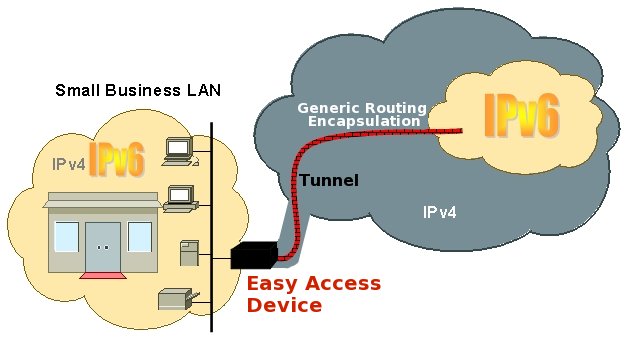Home | Background | Mapping | Enabling | Awareness | Infrastructure | Standards | Contact

Activity 2.4 Easy Access Device
The easy access device provides infrastructure to allow IPv6 connectivity with a 'tunnel appliance' for small businesses and home offices. It allows straightforward, inexpensive IPv6 connectivity, without time-consuming and technically complex site-by-site deployments, and has been implemented on an open standards device.During the Development phase, the IPv6 for e-Business project identified potential solutions, built a prototype device, and wrote the EAD Description Document. During the Testing phase, the IPv6 for e-Business project identified and audited potential test sites, commissioned the access device at appropriate sites, reviewed the functionality of the device, and wrote the EAD Testing Report.
2.4.1 Easy Access Device Development Summary
The Easy Access Device is intended for use by small businesses and home offices. It provides the basic services for an IPv6 Local Area Network on the user's side, and sets up a tunnel to the native IPv6 Internet.
The essential features of the device are:
- It is the access point for the IPv6 tunnel
- It runs DHCP on the user's side to provide IPv6 addresses
- It runs local DNS to provide lookups between Internet names and addresses
- It passes addresses in use to the upstream DNS where available
- It has IPv4 and IPv6 firewalls to provide security
- Its web pages are accessible via IPv6
2.4.2 Easy Access Device Testing Summary
In early 2007 testing took place through various SMEs and BuildersNet. The IPv6 for e-Business project found that:- When a variety of Internet Service Providers' high-speed forms of connectivity were tested, including Telstra Cable modem, Optus cable modem, InterACT DSL and Optus DSL, all ISP services tested tunnelled IPv6 packets without problems.
- A range of people with variable levels of Internet skills were able to install and use the Easy Access Device prototype with only minor difficulties.
Narelle Clark, Vice-President, Internet Society of Australia
and Dr Kate Lance, Internet Society of Australia.
The IPv6 for e-Business project is supported by the Australian Government through the Information Technology Online (ITOL) Program of the Department of Communications, Information Technology and the Arts.